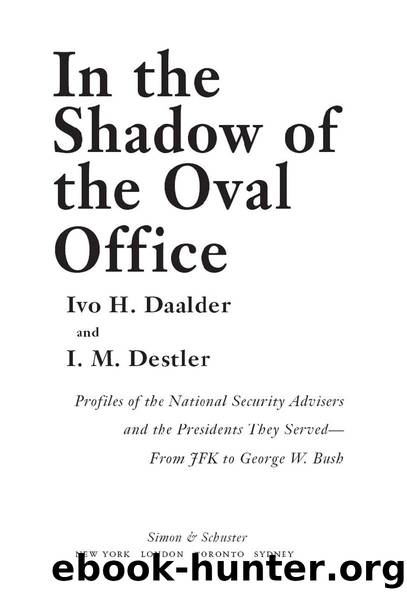In the Shadow of the Oval Office by Ivo H. Daalder & I. M. Destler

Author:Ivo H. Daalder & I. M. Destler
Language: eng
Format: epub
Publisher: Simon and Schuster
Published: 2009-07-15T00:00:00+00:00
At first blush, Brent Scowcroft did not look the part as one of the most powerful personas in the Bush administration. Balding, gray-haired, just five feet eight in his stocking feet, he had what one journalist called the “gaunt demeanor of a church elder.” The retired lieutenant general possessed nothing like the confident pose of natural-born leaders such as James Baker or Colin Powell. He was more comfortable in the shadows, invisible and off to the side. In appearance, he looked more like a presidential aide than a presidential adviser; more servant than sidekick.
Yet looks can be deceiving. For Scowcroft’s real effectiveness—the third ingredient in his winning formula—was that he was closer to the president than anyone else during the four years of the Bush presidency, closer even than Baker. He was constantly at Bush’s side—in the Oval Office, at Camp David, sailing on the waters off Kennebunkport. On an average day, he could spend as many as four hours with the president. That’s how Bush wanted it. Operating in the shadows, Scowcroft was the president’s close and constant confidant. More, he was, Bush confided, “the closest friend in all things”—as close to family as one could get without being blood-related.
It wasn’t just about friendship, though that was important, especially to a Yankee aristocrat like Bush. It was also, and especially, about the exercise of power. Whereas many in Washington sought power through publicity, Scowcroft achieved power through proximity. He built a relationship with the president based on loyalty and trust. His self-effacement helped, as did the fact, as Bush noted, that “Brent doesn’t want anything.” At times, one NSC staffer recalls, “Bush and Scowcroft were like two dimensions of the same person. He was almost like a kind of doppelganger for Bush.” That reality gave Scowcroft tremendous power, both within the administration as a person everyone knew spoke directly for the president and to the world outside. Scowcroft used that power skillfully and judiciously, always making sure that he would not encroach on the responsibilities of other key presidential advisers, like Baker or Cheney, who in turn respected his close relationship with the president.
Aside from proximity, Bush’s activism in foreign affairs helped to empower his national security adviser. The near-instantaneous access to all the latest information enabled Bush to act quickly in response to crises or evolving situations without having to involve other departments. Information would come into the Situation Room; the NSC staff could help analyze and evaluate it; and Bush could get on the phone with leaders around the world to address the issue at hand. During August 1990, the first month of the Gulf crisis, Bush would make no less than sixty-two phone calls to foreign leaders—and not only to such close and important allies and partners as British Prime Minister Margaret Thatcher and Saudi King Fahd, but also to more obscure leaders such as Carlos Andres Perez, president of Venezuela. Such activism naturally enhanced the centrality of the White House in America’s foreign relations—and with it the power of the person in charge of managing foreign policy for the president.
Download
This site does not store any files on its server. We only index and link to content provided by other sites. Please contact the content providers to delete copyright contents if any and email us, we'll remove relevant links or contents immediately.
| Africa | Americas |
| Arctic & Antarctica | Asia |
| Australia & Oceania | Europe |
| Middle East | Russia |
| United States | World |
| Ancient Civilizations | Military |
| Historical Study & Educational Resources |
In Cold Blood by Truman Capote(3374)
The Innovators: How a Group of Hackers, Geniuses, and Geeks Created the Digital Revolution by Walter Isaacson(3131)
Steve Jobs by Walter Isaacson(2888)
All the President's Men by Carl Bernstein & Bob Woodward(2362)
Lonely Planet New York City by Lonely Planet(2210)
And the Band Played On by Randy Shilts(2185)
The Room Where It Happened by John Bolton;(2145)
The Poisoner's Handbook by Deborah Blum(2126)
The Innovators by Walter Isaacson(2096)
The Murder of Marilyn Monroe by Jay Margolis(2090)
Lincoln by David Herbert Donald(1981)
A Colony in a Nation by Chris Hayes(1923)
Being George Washington by Beck Glenn(1888)
Under the Banner of Heaven: A Story of Violent Faith by Jon Krakauer(1788)
Amelia Earhart by Doris L. Rich(1684)
The Unsettlers by Mark Sundeen(1682)
Dirt by Bill Buford(1668)
Birdmen by Lawrence Goldstone(1659)
Zeitoun by Dave Eggers(1641)
